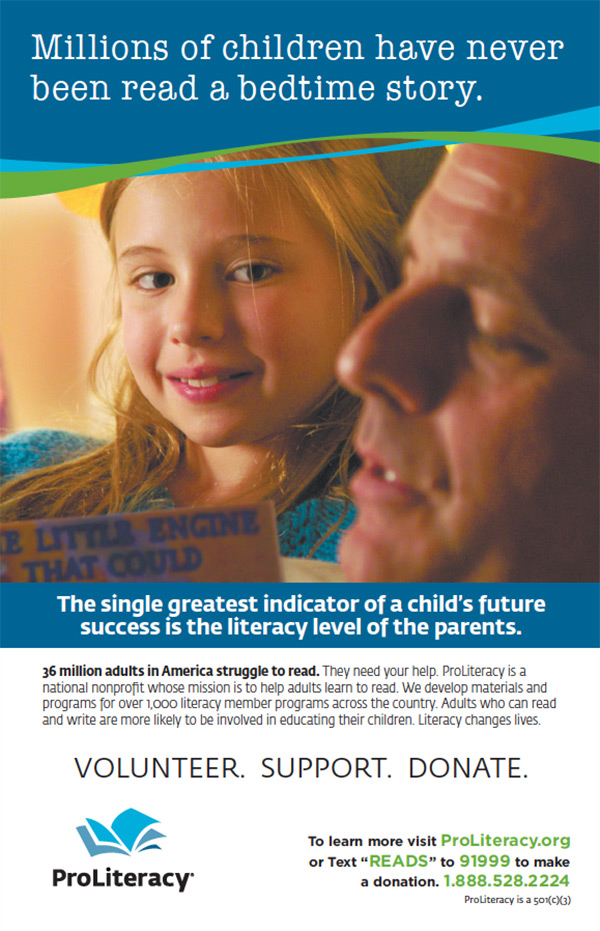Award-Winning Poems: Winter 2018-2019

Welcome to my winter selection of award-winning poems, highlights from our contest archives, and the best new resources we've found for writers. This is the last of our quarterly special issues. We'll be moving this content (with a few changes) into our regular monthly newsletters, published on the 15th of each month.
In this issue: "Before the Battle" by Siegfried Sassoon, illustrated by Julian Peters.
—Jendi Reiter, Editor
Did you receive this newsletter from a friend?
Subscribe here. It's free.
Would you like daily updates on contests and resources for writers?
Join our 110,000 followers on Twitter
Contests open now at Winning Writers, co-sponsored by Duotrope
WERGLE FLOMP HUMOR POETRY CONTEST - NO FEE
Free to enter, $2,250 in prizes, including a top award of $1,000.
TOM HOWARD/JOHN H. REID FICTION & ESSAY CONTEST
$20 entry fee, $5,000 in prizes, including two top awards of $2,000 each.
|
IT'S TRUE. THERE ARE PLACES WE'D RATHER BE and other poems
by Monica Berlin
Winner of the 2018 Crab Orchard Series in Poetry Open Competition
Entries must be received by December 3
This high-profile award series from Southern Illinois University Carbondale gives two prizes of $2,500 and publication for a manuscript by a US poet. Berlin's Nostalgia for a World Where We Can Live was the most recent winner. In this selection of poems, first published in the Museum of Americana: A Literary Review, travel vignettes reveal the difficulty of staying present in the here and now, the elusive space between disappearing memories and the anticipated future.
101, TAIPEI
by Nicholas Wong
Winner of the 2018 Peter Porter Poetry Prize
Entries must be received by December 3
This single-poem prize from Australian Book Review gives awards up to A$5,000 (approximately $3,900) and publication. No simultaneous submissions. This stream-of-consciousness poem inspired by a Chinese pop song conveys the dizzying experience of a 21st-century media culture where everything is hyper-intensified and nothing is quite real.
JAMES BROWN and other poems
by Joann Gardner
Co-winner of the 2018 Poetry Society of America Chapbook Fellowship
Postmark Deadline: December 22
This prestigious poetry institution offers four annual awards of $1,000 plus a $1,000 teaching honorarium for chapbook manuscripts by US authors with no published books. Two of these awards are for authors under 30. Gardner's The Deaf Island was co-winner of the all-ages category. These poems make familiar experiences fresh and vivid through close observation, from the raw energy of a rock concert to the sound of the sea outside an insomniac's bedroom window.
ORRERY
by Eric Smith
Winner of the 2018 Tampa Review Prize for Poetry
Postmark Deadline: December 31
This open manuscript contest from a well-regarded literary journal gives $2,000 and publication. Smith's Black Hole Factory was the most recent winner. This sad and luminous poem re-creates the feeling of watching the space shuttle explode on television, our domesticated entertainment suddenly revealing our vulnerability in the unscripted and unbounded universe.
OPHELIA DREAMS OF SEA URCHINS
by Gillian Cummings
Winner of the 2018 Colorado Prize for Poetry
Postmark Deadline: January 14
This long-running award for a poetry manuscript gives $2,000 and publication by the Center for Literary Publishing at Colorado State University. In this seductively melancholy poem from Cummings' prizewinning The Owl Was a Baker's Daughter, Hamlet's suicidal paramour finds peace in an underwater world.
Read more award-winning poems.
|
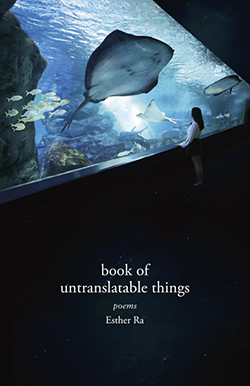
Deadline: January 31, 2019
-
Prize: $500, publication of chapbook and 50 gorgeous copies
-
Reading fee: $20
-
Length: 16-32 pages of poetry
-
Electronic submissions only
-
Submit via Submittable
This year's judge, Leslie McGrath, is the author of two chapbooks and three full-length poetry collections, most recently Feminists Are Passing from Our Lives. McGrath teaches creative writing at Central Connecticut State University and is series editor of The Tenth Gate, a poetry imprint of The Word Works Press.
Simultaneous submissions are permissible if we are notified immediately upon acceptance elsewhere. Multiple submissions are also permitted; a fee must accompany each entry. Including acknowledgments of previously published poems is acceptable but not required. When a manuscript is chosen for publication, we will request acknowledgments.
You can find out more about our press by visiting our website.
Please enjoy this poem by the winner of our 2018 competition, Esther Ra. It's from her collection, book of untranslatable things.
city of light
how can I call you anything but alive:
O my city, O Seoul of South Korea
We are a maze of strung brilliance where hopes hang like light
bulbs,
We are a tightly stretched net of bright fish.
We house half of our nation within our cupped hands,
We are ranked #1st on earth for our Wifi
everyone connected and still so unreachable,
everything closer and farther apart
We have torn down the stars by the gnarl of their roots
We have nailed them alive to our neon-bright signs
We have screwdrived our brains to the top-tier tests
We have split through our skulls and skinned open the skies
therefore our hands tremble, and our tongues have grown faint,
and our faces, they waver like flames
we have swallowed our prayers for fear of the flood,
and our thundering hearts fear a cloud
it is a cloud small as the palm of a praying man's hand,
but how sweet it is full of sweet rain
We fear the cloud small as a praying man's hand, for we have
seen what hands do to rip cracks into craters. Give us
our world of asphalt, only keep it from splinter. Give us
fine dust and ash to breathe through our masks. Give us
gray stone to suck if no warm bread exists. Give us
ashes to breathe in, gray flakes for our lungs.
give us this day our daily bread
and tomorrow our lungs and our singing
We have made our lungs dust & purged Seoul of dirt,
We have cleared out the windflapping wake of the war
We have built cornerstones of unshaken concrete,
constructed our walls of glass and slick limbs.
the sun pounds its rage on our color-code cobble
and in air-conditioned booths
We are no longer afraid
nor remember the soft swirls of gneiss
underneath our old streets,
nor the curve of blue roof
that sliced through the sky
With a screech of our axles with the crash of our lifts
We are moving so quickly so swiftly so fast
We have shattered the silence nothing can touch us
no war no damn screaming
no ravines no fleas
no hunger no flood &
no throats sweet with blood
and the eight hundred artillery guns
on the borders of North Korea
they open their mouths and they laugh
For where, O death, is your sting
and where, O life, is your grace
|
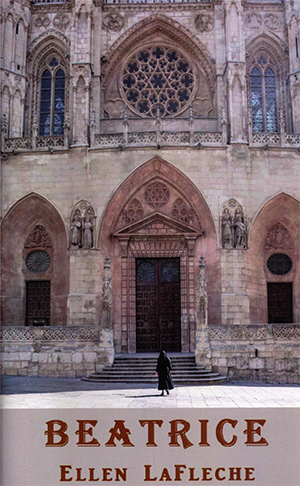 Ellen LaFleche, a judge of the North Street Book Prize, explores the emotional life of a semi-cloistered nun in this chapbook from Tiger's Eye Press. Sister Beatrice serves on a jury, bakes bread in the convent kitchen,
scatters her mother's ashes in the ocean, and reflects on her friendship with another nun. Order directly from Ms. LaFleche for $10 at ElLaFleche@aol.com. Ellen LaFleche, a judge of the North Street Book Prize, explores the emotional life of a semi-cloistered nun in this chapbook from Tiger's Eye Press. Sister Beatrice serves on a jury, bakes bread in the convent kitchen,
scatters her mother's ashes in the ocean, and reflects on her friendship with another nun. Order directly from Ms. LaFleche for $10 at ElLaFleche@aol.com.
"The tides of the sacred feminine seek an outlet in the cloistered body of Sister Beatrice, a working-class mystic. The convent offers both refuge and confinement—the paradox of a women-ruled society where women must de-sexualize themselves. The ascetic environment cannot quench the vitality of Beatrice's imagination, which finds golden-faced gods in copper pans and lust's soft satisfaction in a raw quahog."
—Jendi Reiter, editor, Winning Writers, and author of Bullies in Love
Please enjoy this poem from Beatrice:
Pearl
The day after scattering her mother’s ashes in the ocean, Sister Beatrice goes quahogging
Morning-scape.
Clouds arranged in blurred
bands of coral and pink like lipstick samples
on the back of the Avon Lady's hand.
Twenty years inside
that tomb-shaped nun boot
but Sister Beatrice's foot
remembers its childhood skill—
how to stalk the quahog,
big toe trawling the tide
like a predator's snout.
Cool wind whirling off the waves
in salt-loaded squalls.
Sister's veil flaps so hard around her skull
it muffles the crackle of foam,
the slap of kelp and jetsam.
The clam she captures is still
alive, breathy and warm
in its hinged brown casket.
The clam-flesh dampens under her finger,
its belly slack as love in its puddle of juice,
elegant neck recoiling
from Sister's tender pinch.
She knows the danger
of eating it raw. But Beatrice swallows,
the head-tilted gulp
a remembered pleasure in her throat.
|
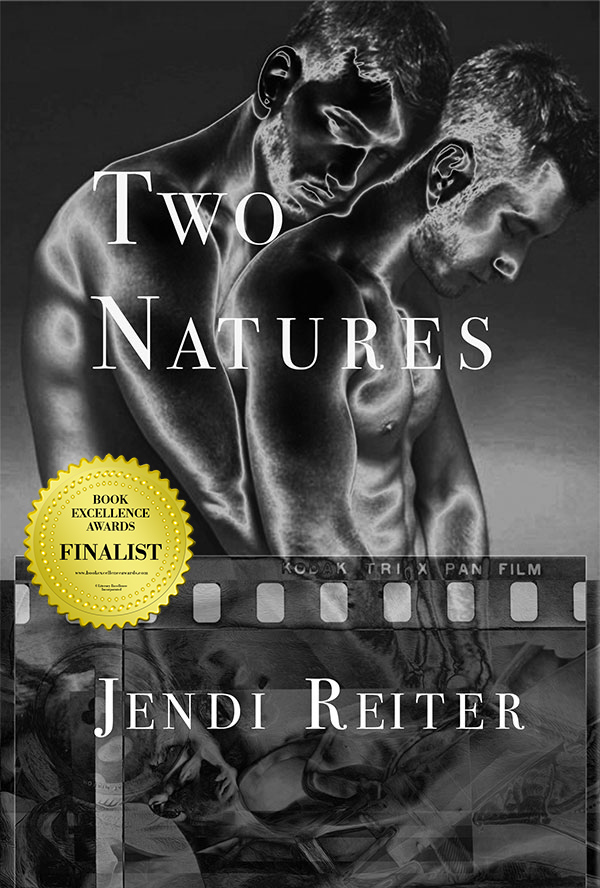
Set in New York City in the early 1990s, Jendi Reiter's debut novel Two Natures (Saddle Road Press) is the coming-of-age story of Julian Selkirk, a fashion photographer who struggles to reconcile his Southern Baptist upbringing with his love for other men.
-
2016 Rainbow Awards: First Prize, Best Gay Contemporary Fiction; First Runner-Up, Debut Gay Book
-
Named one of QSpirit's Top LGBTQ Christian Books of 2016
-
2016 Lascaux Prize in Fiction Finalist
-
2017 National Indie Excellence Award Finalist
-
2017 Book Excellence Awards Finalist
-
2018 EPIC eBook Awards Finalist
5-star Goodreads review by Tom Taylor (The Poet Spiel):
"Reiter's remarkable expertise with steamy tales, and insider understanding of those AIDS-haggard years, present a rich narrative so real you will be certain it is autobiographical.
"In the raging battle between lust and the harsh reality of queer heroes taken out by the 'gay cancer', lust sometimes wins the contest: Rock Hudson, Keith Haring, Nureyev, Robert Mapplethorpe, Liberace, far too many more, all of them gone; often in shame. Why is the lust for flesh powerful enough to end the bright lives of queer men? Reiter skillfully chronicles the ugly process, sometimes with humor, other times with raw, aching pictures of fear and grief.
"This is one book where you CAN judge a book by its cover: too hot to handle; a pair of glistening, sweat-steamed men, merged as one and inseparably welded by flesh on fire."
Buy Two Natures on Amazon
|
|
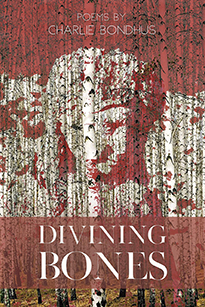
Charlie Bondhus
DIVINING BONES
This third collection from an award-winning poet stakes its territory in the liminal spaces between male and female, fairy-tale and horror, the archetypal struggle in the psyche and the mundane (but no less dangerous) conflicts of domestic life. The presiding deity of this shadow realm is Baba Yaga, the child-eating forest witch of Eastern European folklore, who guides the narrator to embrace traits rejected by mainstream gay culture. Aging, emasculation, and the grotesque lose their stigma and become sources of transgressive power.
Charles Burns
LAST LOOK
This volume collects Burns' acclaimed graphic novels X'ed Out, The Hive, and Sugar Skull. Imagine that Samuel Beckett and Hieronymus Bosch dropped acid together and wrote a Tintin comic. These horror comics braid the real-world story of Doug, a photographer and failed performance artist obsessed with his lost love Sarah, with the nightmare visions of his alter ego, Johnny 23, a low-level functionary in a breeding factory where woman-like creatures produce monstrous eggs. The features of his grotesque dream world gradually reveal parallels to Doug's real life and the relationship patterns that trap him in isolation. Subtle clues toward the end indicate a Buddhist message about purifying one's mind to escape the wheel of rebirth.
Karen Hayes
THE HOUSES ALONG THE WALL: A PEMBROKESHIRE POETRY CYCLE
With stately cadence and tender attention to detail, this poetry chapbook imagines personal histories for a row of old houses in a Welsh seaside village, where a dwindling community depends on tourism to replace the fishing economy. The style and setting have the flavor of T.S. Eliot's "The Dry Salvages", without the philosophical pomposity.
Naomi Novik
SPINNING SILVER
This fantasy novel about the braided destinies of three resourceful young women draws on elements of Eastern European fairy tales to create a legend all its own. In a twist on the story of Rumpelstiltskin, a Jewish moneylender's daughter in an alternate-history 19th-century Lithuanian village is kidnapped by the king of the Staryk, sinister ice fairies who want her to turn their enchanted silver into gold. Meanwhile, her peasant housekeeper finds heroism thrust upon her as she strives to protect her young brothers from their abusive father. Their adventures intersect with a reluctant tsarina trying to save her people from the fae's perpetual winter spell. Multiple narrative viewpoints weave a complex tapestry of conflicting loyalties that are ingeniously resolved. Though the book ends, as a good fairy tale should, with some romantic happy-ever-after's, the primary narrative thread is how
the three girls grow into their unchosen obligations and become brave leaders.
Raina Telgemeier
GHOSTS
Children and adults alike will shed happy tears over this graphic novel about a Mexican-American family whose younger daughter has cystic fibrosis. In the days leading up to Día de los Muertos, the sick girl and her older sister cope with impending mortality through encounters with friendly spirits.
|
Advertisers: We send this newsletter to over 50,000 subscribers. Ads are just $150 each. On a tight budget? Pressed for time? Advertise to our 110,000 Twitter followers for just $40 per tweet or less.

Solo mailings and website advertising available. Inquire with Adam Cohen at adam@winningwriters.com.
|
Julian Peters writes, "In honour of Remembrance Day and of the hundredth anniversary of the end of WWI, an adaptation of a poem by my favourite war poet, Siegfried Sassoon. Sassoon (1886-1967) wrote this poem only a few days before the Battle of the Somme, in which the poet participated. The first day of the Somme, on July 1st, 1916, still holds the record as the bloodiest single day in British military history, with 19,240 fatalities.
"The fact that, on top of the many natural and inevitable miseries that the world already provides us with, humankind should repeatedly choose to add the ultimate horror of war must surely always stand as the greatest failing of our species.
"This comic was commissioned by and originally appeared in the American magazine Plough Quarterly."
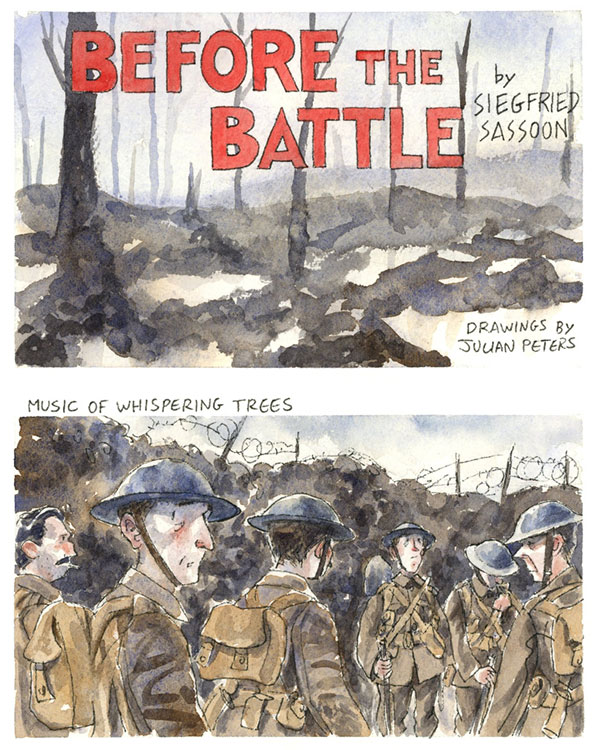
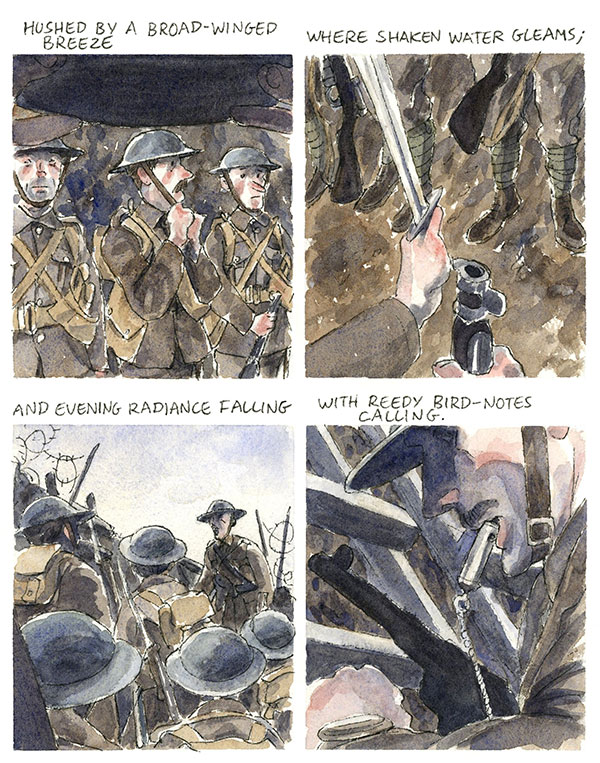
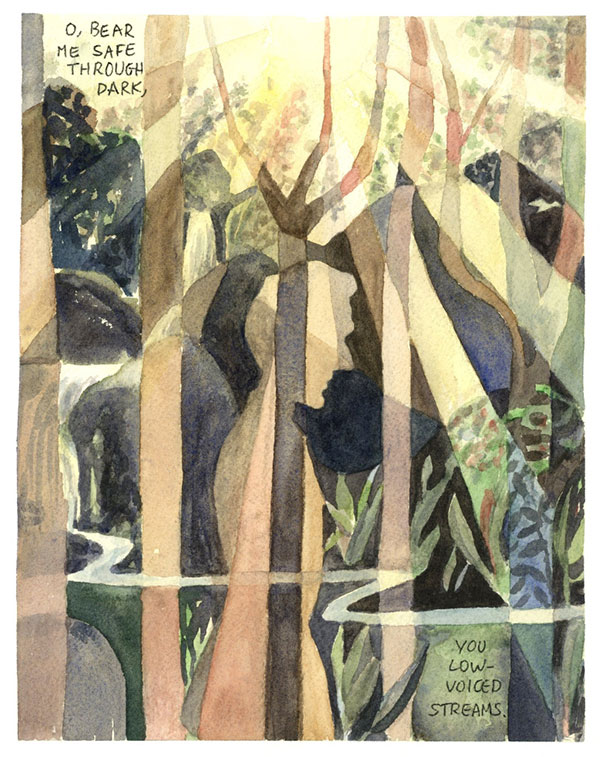
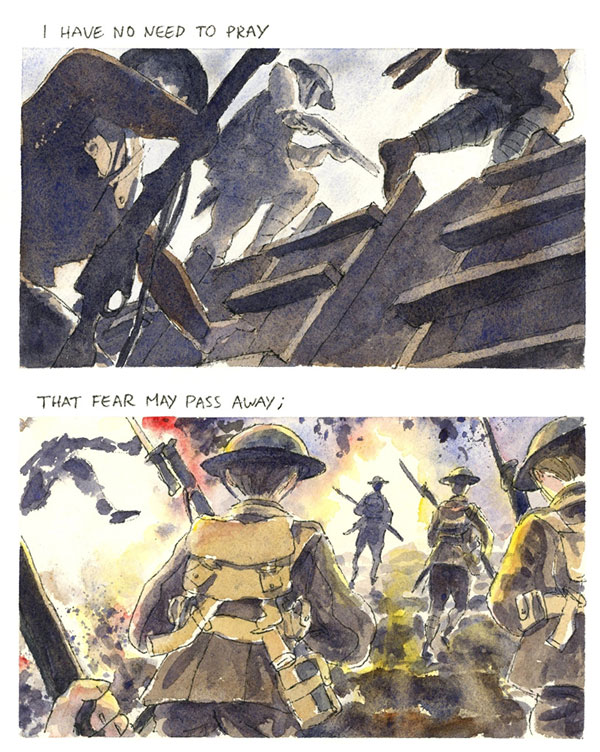
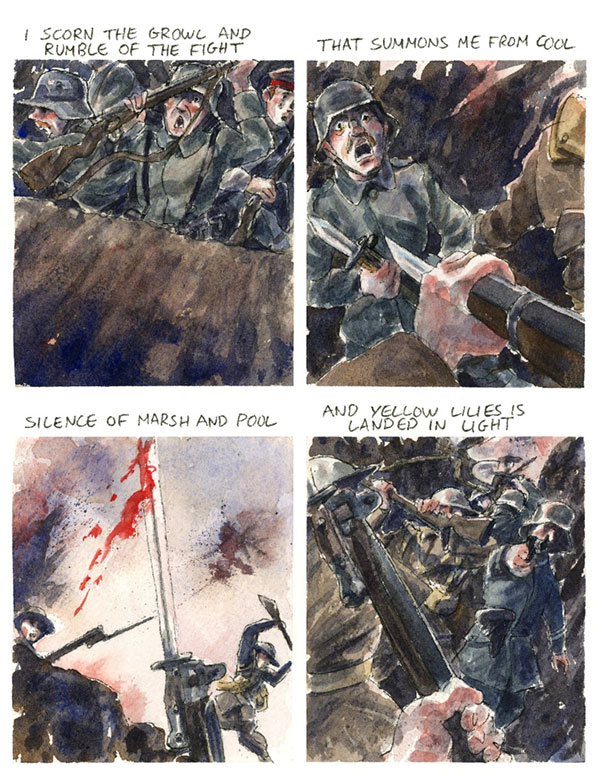
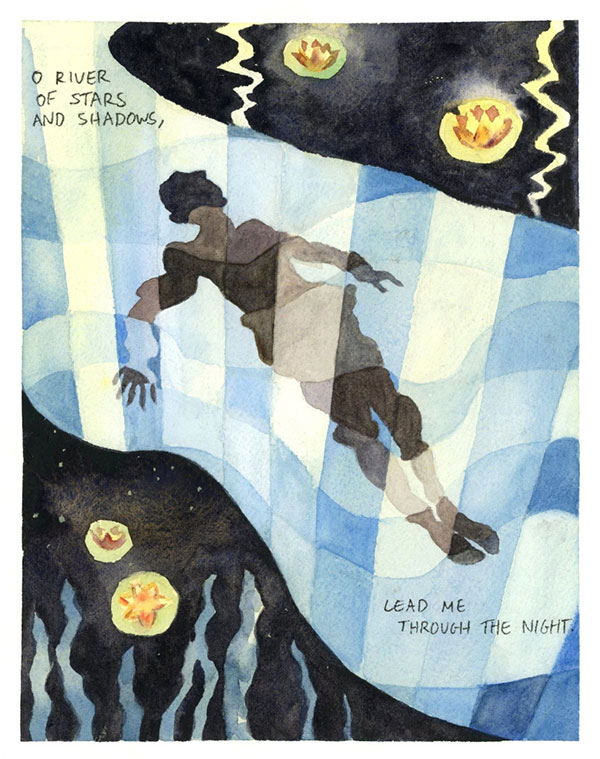
Reprinted by kind permission of Julian Peters. Learn more at Mr. Peters' website.
|
|

|
|
|












